阅读量:0
一、Mongoose 的介绍
Mongoose 是一款嵌入式 Web 服务器库,具有跨平台、轻量级、支持多种网络协议、稳定可靠等特点。

国内下载地址:
https://gitee.com/mirrors/mongoose.git
官方链接:
https://mongoose.ws/
参考说明文档:
https://mongoose.ws/documentation/
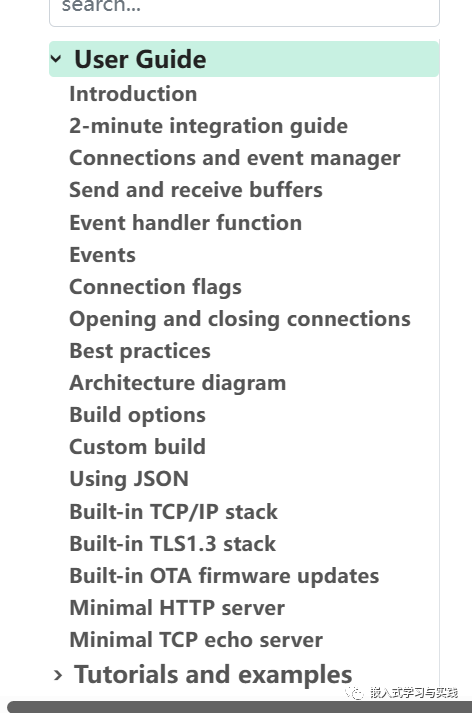
二、移植
Linux下移植非常简单,只需要将mongoose.c和mongoo.h文件复制到工程中即可。

三、测试
根据手册进行简单测试,手册如下:
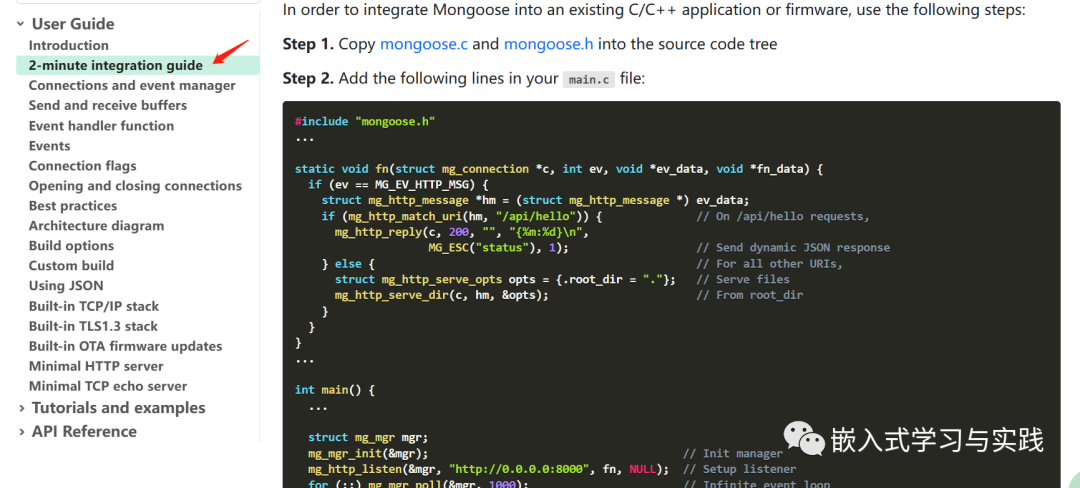
测试代码如下:
// Copyright (c) 2020 Cesanta Software Limited // All rights reserved #include <signal.h> #include "mongoose.h" static int s_debug_level = MG_LL_INFO; static const char *s_root_dir = "."; static const char *s_listening_address = "http://0.0.0.0:8000"; static const char *s_enable_hexdump = "no"; static const char *s_ssi_pattern = "#.html"; // Handle interrupts, like Ctrl-C static int s_signo; static void signal_handler(int signo) { s_signo = signo; } // Event handler for the listening connection. // Simply serve static files from `s_root_dir` static void cb(struct mg_connection *c, int ev, void *ev_data, void *fn_data) { if (ev == MG_EV_HTTP_MSG) { struct mg_http_message *hm = (struct mg_http_message *) ev_data; if (mg_http_match_uri(hm, "/api/hello")) { // On /api/hello requests, mg_http_reply(c, 200, "", "{%m:%d}\n", MG_ESC("status"), 1); // Send dynamic JSON response } else { // For all other URIs, struct mg_http_serve_opts opts = {.root_dir = "."}; // Serve files mg_http_serve_dir(c, hm, &opts); // From root_dir } } } static void usage(const char *prog) { fprintf(stderr, "Mongoose v.%s\n" "Usage: %s OPTIONS\n" " -H yes|no - enable traffic hexdump, default: '%s'\n" " -S PAT - SSI filename pattern, default: '%s'\n" " -d DIR - directory to serve, default: '%s'\n" " -l ADDR - listening address, default: '%s'\n" " -v LEVEL - debug level, from 0 to 4, default: %d\n", MG_VERSION, prog, s_enable_hexdump, s_ssi_pattern, s_root_dir, s_listening_address, s_debug_level); exit(EXIT_FAILURE); } int main(int argc, char *argv[]) { char path[MG_PATH_MAX] = "."; struct mg_mgr mgr; struct mg_connection *c; int i; // Parse command-line flags for (i = 1; i < argc; i++) { if (strcmp(argv[i], "-d") == 0) { s_root_dir = argv[++i]; } else if (strcmp(argv[i], "-H") == 0) { s_enable_hexdump = argv[++i]; } else if (strcmp(argv[i], "-S") == 0) { s_ssi_pattern = argv[++i]; } else if (strcmp(argv[i], "-l") == 0) { s_listening_address = argv[++i]; } else if (strcmp(argv[i], "-v") == 0) { s_debug_level = atoi(argv[++i]); } else { usage(argv[0]); } } // Root directory must not contain double dots. Make it absolute // Do the conversion only if the root dir spec does not contain overrides if (strchr(s_root_dir, ',') == NULL) { realpath(s_root_dir, path); s_root_dir = path; } // Initialise stuff signal(SIGINT, signal_handler); signal(SIGTERM, signal_handler); mg_log_set(MG_LL_DEBUG);//mg_log_set(s_debug_level); mg_mgr_init(&mgr); if ((c = mg_http_listen(&mgr, s_listening_address, cb, &mgr)) == NULL) { MG_ERROR(("Cannot listen on %s. Use http://ADDR:PORT or :PORT", s_listening_address)); exit(EXIT_FAILURE); } if (mg_casecmp(s_enable_hexdump, "yes") == 0) c->is_hexdumping = 1; // Start infinite event loop MG_INFO(("Mongoose version : v%s", MG_VERSION)); MG_INFO(("Listening on : %s", s_listening_address)); MG_INFO(("Web root : [%s]", s_root_dir)); while (s_signo == 0) mg_mgr_poll(&mgr, 1000); mg_mgr_free(&mgr); MG_INFO(("Exiting on signal %d", s_signo)); return 0; }在vs code中打开终端,输入如下指令

可以看到程序自动运行。
打开浏览器输入ip地址和端口,可看到如下:
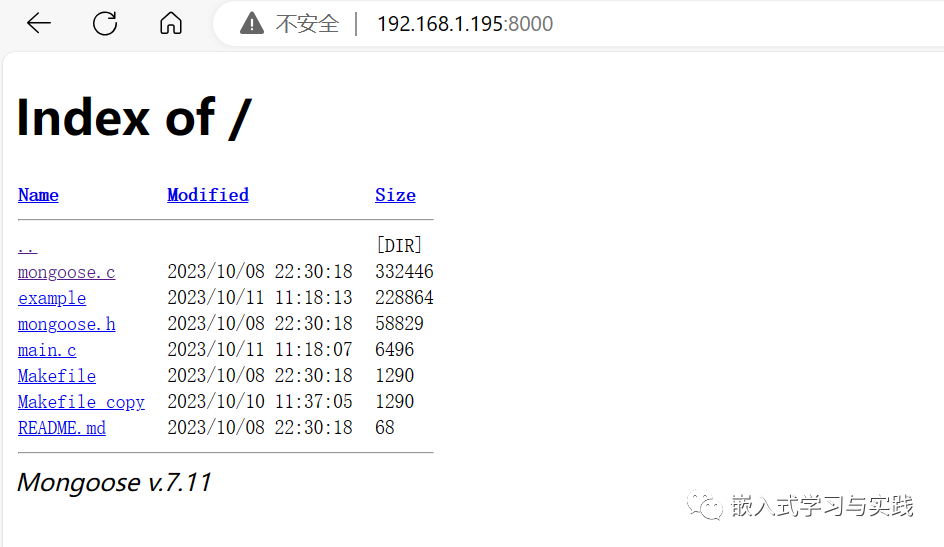
输入测试指令,可获取到返回信息
http://192.168.1.195:8000/api/hello

简单介绍下相关的函数和结构体,如下:
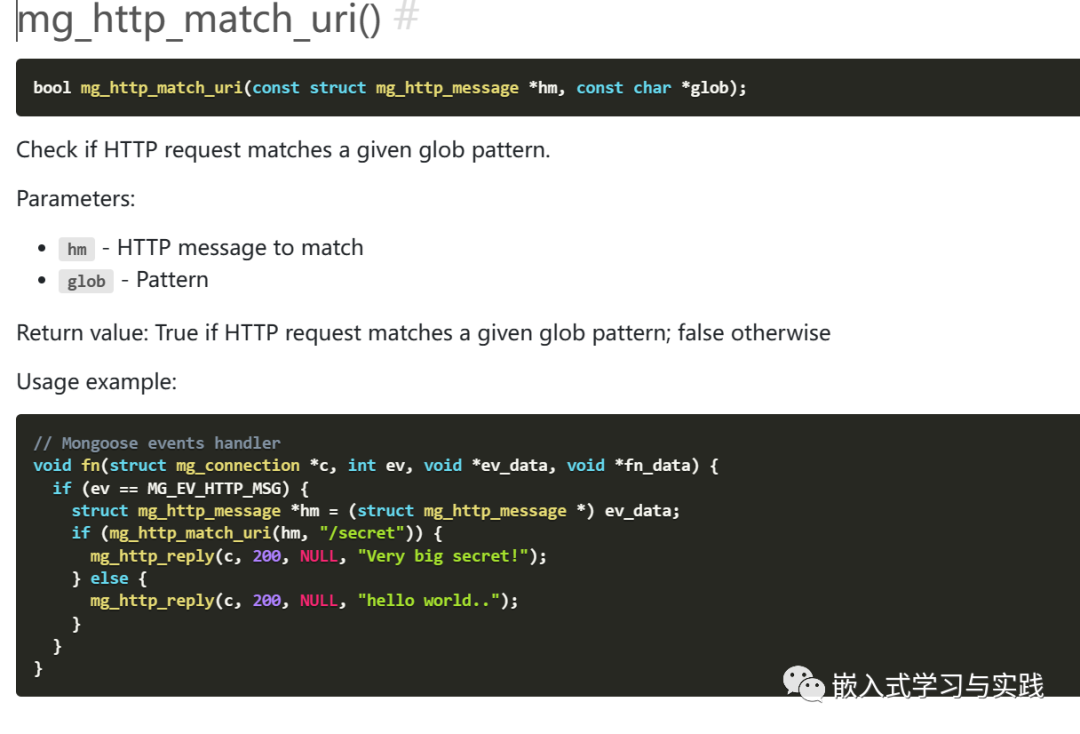
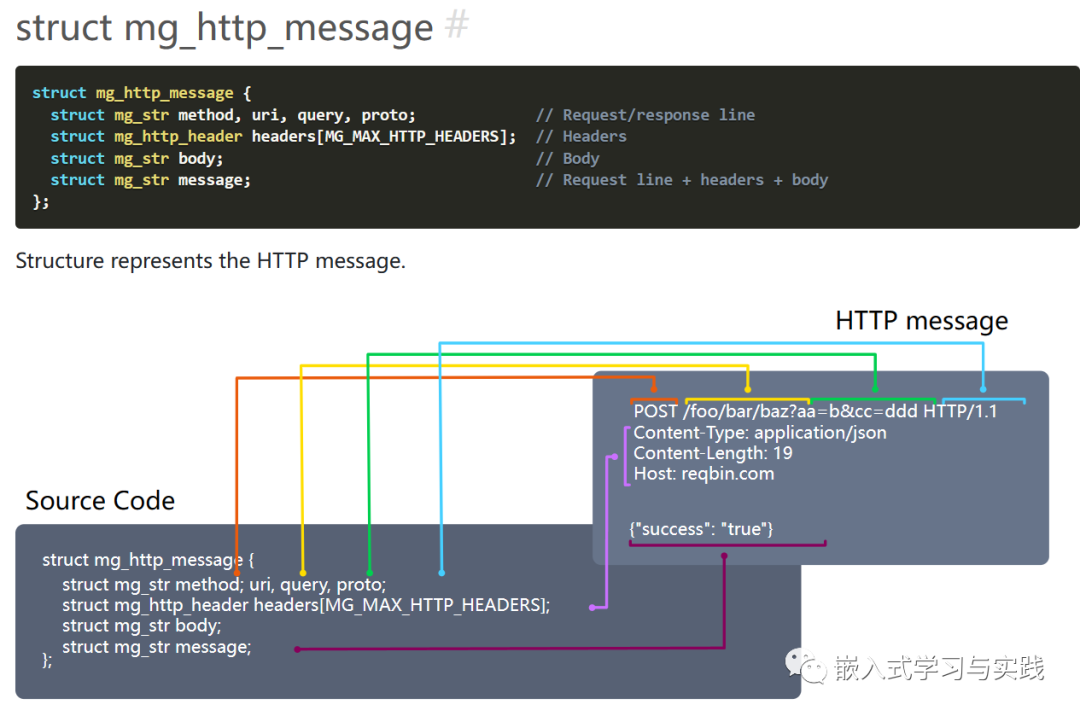
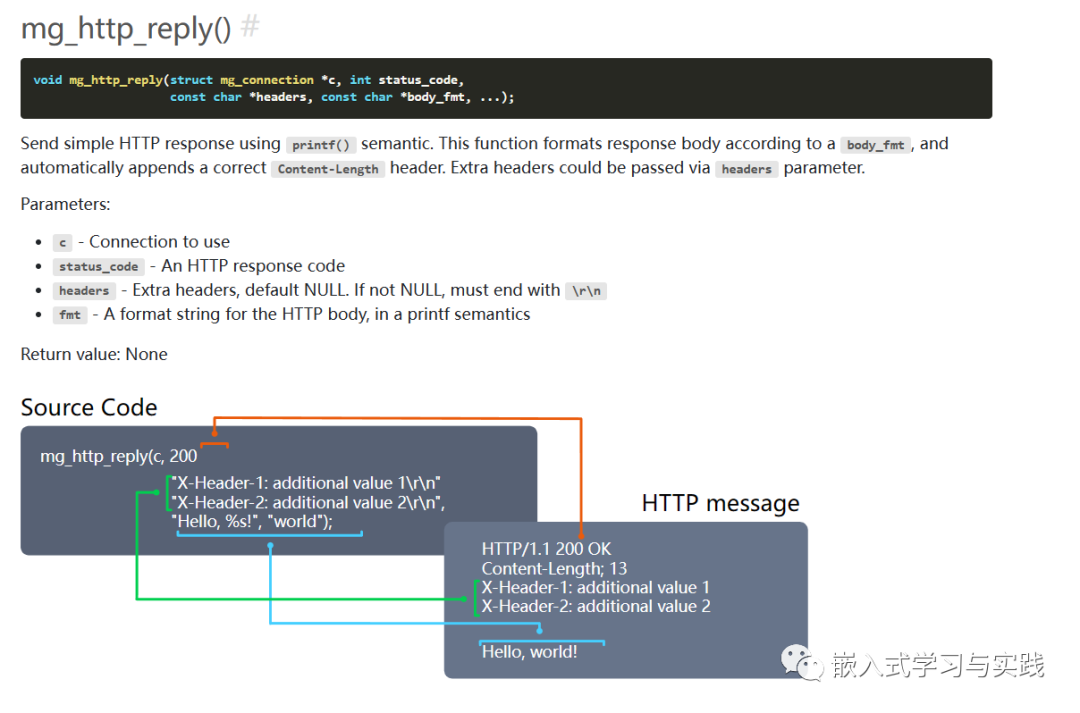
简单示例,post和get方法:
static void cb(struct mg_connection *c, int ev, void *ev_data, void *fn_data) { struct mg_http_message *hm = ev_data; if (ev == MG_EV_HTTP_MSG) { if (strstr(hm->method.ptr, "POST")) { if (mg_http_match_uri(hm, "/haha")) { printf("这是POST请求\n"); printf("body:%s\n",hm->body); mg_http_reply(c, 200, "Content-Type: application/json\r\n", "{%.*s:%.*s}", (strlen("已经收到client请求")),"已经收到client请求", hm->message.len,hm->message); } else { mg_http_reply(c, 500, NULL, "{%.*s:%.*s}", (strlen("已经收到client请求")),"已经收到client请求",hm->message.len, hm->message); } } else if (strstr(hm->method.ptr, "GET")) { if (mg_http_match_uri(hm, "/haha")) { printf("这是GET请求\n"); mg_http_reply(c, 200, "Content-Type: application/json\r\n", "{%.*s:%.*s}", (strlen("已经收到client请求")),"已经收到client请求", hm->message.len,hm->message); } else { mg_http_reply(c, 500, NULL, "{%.*s:%.*s}", (strlen("已经收到client请求")),"已经收到client请求", hm->message.len,hm->message); } } else { mg_http_reply(c, 500, NULL, "{%.*s:%.s}", (strlen("已经收到client请求")),"已经收到client请求",hm->message.len,hm->message); } } (void) fn_data; }欢迎关注公众号:嵌入式学习与实践
